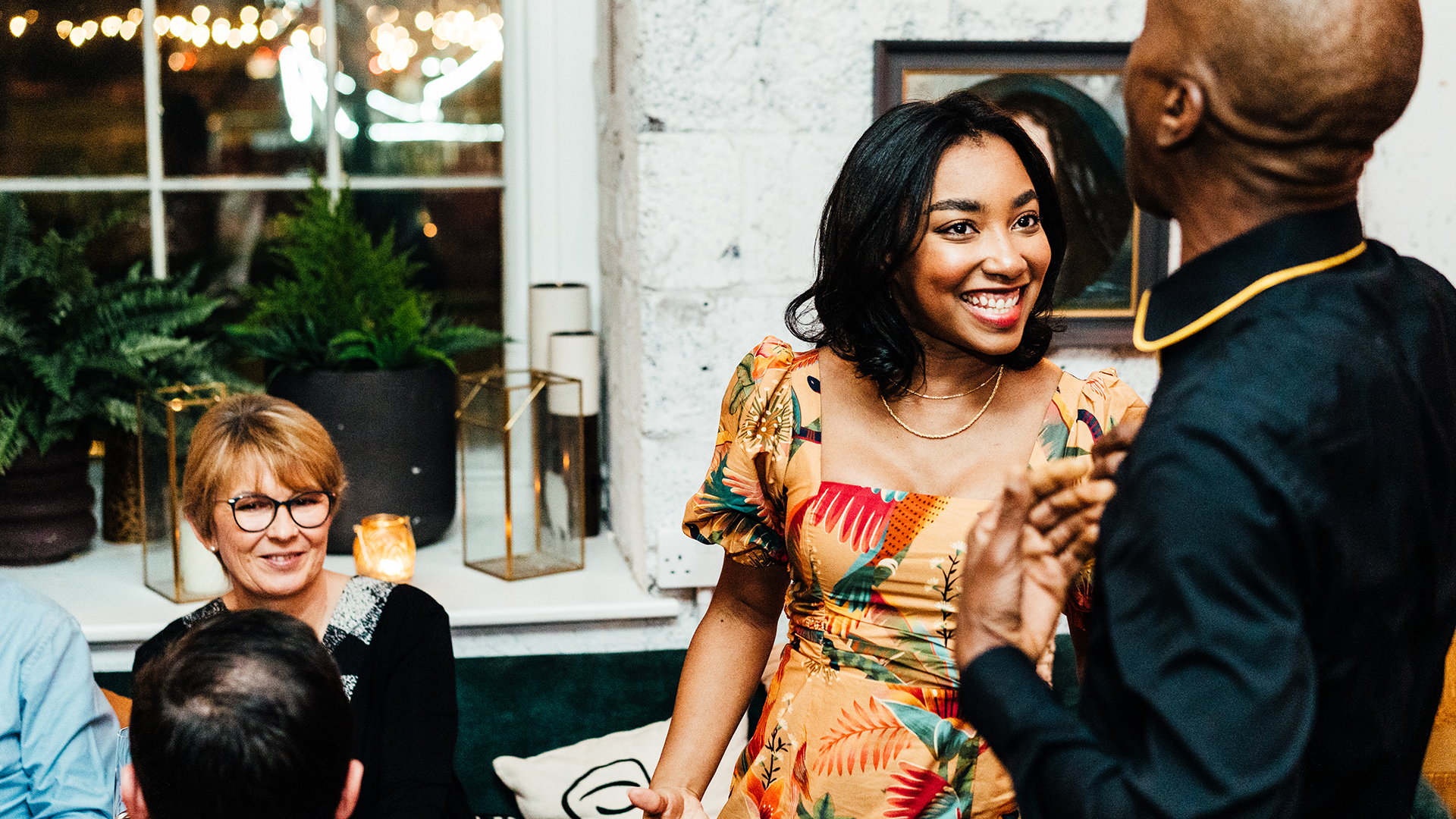Does having dinner with strangers sound nerve wracking to you? You aren’t alone. Our guests at Kindred’s monthly Community Dinner—where 100 strangers gather in our building to share a meal and connect—often say they felt apprehensive before coming.
After all, talking to people you don’t know can definitely feel scary! But our guests leave with a smile—and often, a budding friendship in tow.
That’s because meeting new people is almost always easier than you think. And it’s good for you: studies show that social interactions, even on a minimal level, can boost your wellbeing.
So, how do you do it then? Here’s our top tips for striking up a conversation with anyone, and chatting away to strangers with ease.
Why is it so hard to talk to strangers?
When you put yourself out there and talk to someone new, you’re heading into the unknown: you don’t know how the person will react to you, whether or not it will be awkward, or whether you simply won’t like them.
All of those thoughts are understandable: everyone wants to feel accepted. And on some level, most of us fear rejection.
It’s normal to feel nervous about meeting new people. But this headspace can make you feel intimidated or even overwhelmed by social situations. Though if you can push through those feelings, chances are that you’ll enjoy the conversation way more than you thought.
In fact, research shows that most people underestimate how much their conversation partner will like them—and usually, they feel that the chat went way better than they expected.
Why you should talk to new people
What’s more, talking to new people is actually good for you—yes, even if you’re an introvert!
There’s a growing body of scientific research to back that up. Talking to strangers helps us gain knowledge and new perspectives, puts us in a better mood, and makes us feel more connected to other people.
In one study, researchers asked commuters on a train in Chicago to speak to strangers near them. People said they had a more positive experience when they made the connection—despite thinking that they’d prefer to complete the train ride in silence.
Feeling connected to others has also been linked to better heart, metabolic, and mental health.
8 tips for talking to strangers

1. Have an open mind
We’d argue that this is probably the most important tool in your arsenal when meeting new people. You can’t predict what others will be like, but being open minded helps you to see, accept, and interact with people as they are.
This gives you the ability to lean in to new experiences—as well as taking the pressure off. A chat with a stranger is just a chat with a stranger, it doesn’t have to be anything more.
And if you can, try to have a positive attitude. Not only will this make you seem more approachable, but it will make the experience way more pleasant for you.
2. Ask questions
Being interested in other people is also key to sparking conversation. Don’t be afraid to ask them questions: are they enjoying themselves? What do they do for fun? Where did they get their coat?
When you ask someone a question, it shows that you’re engaged and interested in them. It’s a great way to break the ice, learn more about them, and get the chat in motion. There’s even research showing that people who ask more questions in conversation (especially follow-up questions) are better liked by their conversation partners.
We’d suggest asking open-ended questions, as this paves the way for the conversation to naturally branch off in different directions.
3. Actively listen
It’s sometimes said that the best conversationalists are attentive listeners. We couldn’t agree more. If you give someone your full attention, you make them feel heard and respected. This tees you up to have a great conversation—or even to form a friendship.
Active listening means that you don’t just hear the words someone is telling you, but you’re fully engaged and understand what they’re trying to say. It’s about being focused and present when they’re sharing with you. For instance, you might clock their body language or tone of voice to help gauge how they feel.
Not only does this show the other person that you respect them, but it can help you to understand them better.
4. Compliment freely
Compliments are brilliant icebreakers. We’re not suggesting you throw them around disingenuously, but something as simple as: “Hi, I love your trousers!” can be enough to get a great conversation going.
It feels good to give compliments—and it’s lovely to receive them. Your chat will start off on the right foot thanks to the positive shift in energy, which can also help counter any awkwardness you were feeling.
5. Don’t force it
Sometimes conversations go well and sometimes they don’t. And that’s perfectly okay.
If you put too much pressure on an interaction, we can pretty much guarantee that you’ll find it less enjoyable. People will be able to pick up on your vibes, which might in turn make them more nervous. And if you’re on edge, it’s harder for the conversation to naturally ebb and flow.
You don’t have to talk more to fill the silence (and we wouldn’t recommend doing this, anyway. It’s not particularly pleasant for either party). When a chat just isn’t clicking, it’s okay to say something like, “It was lovely talking to you!” and make a polite exit.
6. Share something about yourself
As well as asking questions, it’s important to share things about yourself, too. We’re not suggesting that you tell a stranger your life story. But even when you share something simple—be it about your job, hobbies, how you’re enjoying the event, or where you’re from—you’re giving your conversation partner something to work with. You’re giving them the chance to connect with you.
And you don’t have to wait to be asked a question before offering something up. In fact, giving up some basic information can be a great way to introduce yourself. For example: “Hi, I’m Jen, I’m a childhood friend of the host.”
7. Chat about shared interests
Try to find something you have in common with your conversation partner. For one, it’s a lot more fun to talk about something you enjoy than making polite chit-chat. And it can also make it much easier for the two of you to connect.
Maybe you’re both keen cyclists or support the same football team. Or perhaps you both loved a recent TV series that came out. You’ll never know until you ask.
Having shared interests brings people together. And it’s a great foundation to build a friendship on.
8. Keep practicing
Talking to new people is a skill that can be practiced—and, dare we say, mastered. The more you do it, the easier and more familiar it will feel.
It’s true: you’ll get better at asking questions, reading people’s tone and nonverbal cues, and understanding when a chat is naturally winding down. You’ll begin to feel more comfortable opening up and sharing things about yourself.
Research suggests that most people are willing to have a chat with you when prompted. So if you find yourself in a room full of new people, bite the bullet and say hello.
Your local spot for meeting new people
Looking for an event to try out your new skills? At Kindred, we regularly host community socials and events that are designed to bring people together.
In fact, that’s why we opened Kindred in the first place: to create a space where connecting with others feels effortless, and everyone feels welcome. You could think of us as your city campfire.
Every year, we host TogethernessFest: a programme of dinners, walks, talks, and workshops designed to facilitate connection. It’s about celebrating adult friendship and reminding us how important community ties are.
Here at Kindred: we make friends. We’d love it if you joined us.




